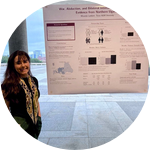About This Project
This research investigates the enduring impact of childhood exposure to violence on bilateral intimate partner violence in Northern Uganda where thousands of boys and girls were abducted by the Lord’s Resistance Army during childhood. My current survey shows that the abduction status of both partners matters for household violence. To understand the mechanisms, I will conduct lab-in-the-field experiments to examine self-control, patience, retaliation, and empathy.
Ask the Scientists
Join The DiscussionWhat is the context of this research?
I focus on the Acholi region of Northern Uganda, a unique setting where both men and women were violently abducted into an insurgent army to become child soldiers, forced laborers, or unconsenting brides. More than 25,000 children were taken at random from their homes between 1986-2006 by the Lord’s Resistance Army. When the war concluded, those abducted were freed and expected to reintegrate into their villages with little outside assistance.
What is the significance of this project?
This work underscores the intricate interplay between early exposure to violence and subsequent intimate relationships, shedding light on the complex dynamics shaping patterns of IPV following experiences of childhood trauma.
What are the goals of the project?
The goal of this project is to better understand the mechanisms driving extremely high rates of IPV. My existing survey shows evidence that exposure to war violence matters and adding these experiments will help to explain why this may be the case. The games will look into patterns of self-control, patience, retaliation, and empathy that may alter the way partners interact.
Budget
My project has received generous funding from the economics department and the Economics Research Lab (ERL) at Texas A&M University to cover payments for the participants and some of the field team. I have also received awards to cover travel expenses. All that is left is to cover part of the salaries for my hard working enumerators/field team.
Endorsed by
 Project Timeline
Project Timeline
The project is set to be completed between July and September 2024. I will travel to Uganda in July for trainings and then we will begin fieldwork throughout the month. After returning from the field, I will analyze the data and complete a working draft of the paper in Spring 2025.
May 25, 2024
Project Launched
Jul 09, 2024
Travel to Northern Uganda
Jul 15, 2024
Train Enumerators
Jul 17, 2024
Begin Field Work
Aug 01, 2024
Conclude Field Work
Meet the Team
Team Bio
I am advised by Dr. Danila Serra and Dr. Catherine Eckel in the Department of Economics at Texas A&M University. Each decision for the project will be made with their guidance and expertise.
I am working with GapLink research firm in Northern Uganda. All enumerators are highly experienced and come from the region themselves. They, along with the field manager, bring invaluable expertise and local knowledge.
Miranda Lambert
I am currently a fifth year PhD student in economics at Texas A&M University. I have been doing fieldwork for almost a decade answering questions surrounding development, gender, and experimental economics.
Lab Notes
Nothing posted yet.
Project Backers
- 19Backers
- 100%Funded
- $1,950Total Donations
- $102.63Average Donation

